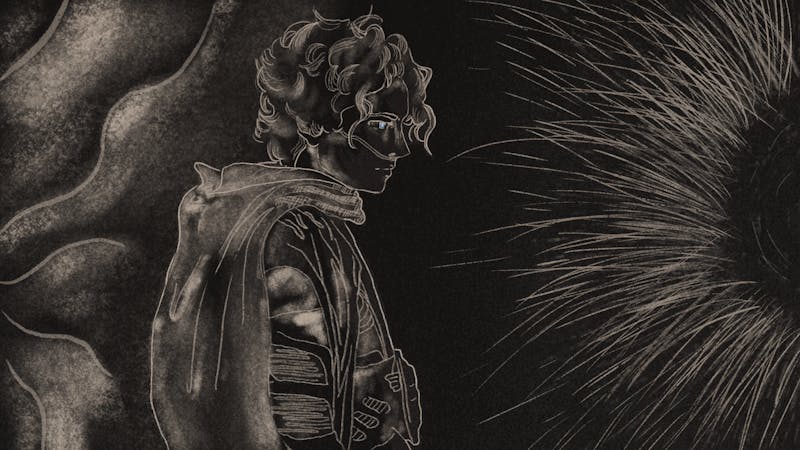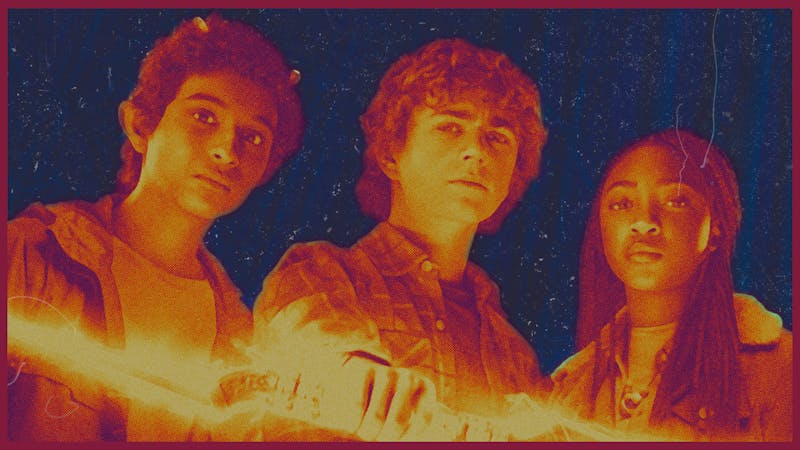In Challengers, Luca Guadagnino, most known for Call Me By Your Name, transforms a simple challenger tennis match, a match close to the lowest level of tournament on a pro tour, into a high–stakes game dripping with adrenaline, sexual tension, and depravity.
The premise is simple: Tashi, played by Zendaya, coaches her world–famous tennis star husband Art (Mike Faist). Art’s losing streak and waning confidence prompt Tashi to set up a deceptively easy match to boost his confidence. Orchestrated by Tashi, the opponent on the other side of the net is none other than Art’s childhood best friend and Tashi’s ex–boyfriend Patrick (Josh O’Connor).
Establishing an intricate web of emotions, Guandagnino constructs the film like a tennis match. With each jump cut, the film continuously swings the audience back and forth from past to present, like a whizzing tennis ball flying across the net. Challengers culminates in the collision of past and present, forcing Art and Patrick to fight for their devotion, as every game must end with a winner.
One of the first flashbacks in the movie is a scene prominently featured in the trailer of the trio as teenagers right before they enter college. Their desire for freedom and sex is palpable as Art purrs to Tashi: “Aren’t you everybody’s type?” The scene culminates in the trailer’s most iconic shot as Tashi looks up mischievously and knowingly at the camera while both men passionately make out with each other. Leading up to the makeout, she teasingly asserts her unavailability in getting with either due to not wanting to be a “homewrecker.”
However, Tashi’s true love resides in tennis. Anything she can do in her power to create interesting tennis is fair game, even eventually turning against her word and becoming a homewrecker, all while being a mother.
The ultimate result of her devotion to tennis is the eventual challenger match, where Tashi certainly succeeds in crafting breathtaking tennis: I was kept enraptured by the final fifteen minutes of the match. When the film concluded, I sat in silence, marveling at how everybody’s goals end with one satisfying smack against the tennis court floor.
In spite of the flashy trailer and the languid shots forcing the audience to take in the attractiveness of each actor, at no point does the film ever feel like it follows the familiar beats of a love triangle in any Hollywood blockbuster. Instead, Guadagnino engineers a distinctly stylish movie.
For one, he doesn't shy away from the fact that in order for a three way relationship to be a love triangle, there needs to be some homosexual relationship. At the climax of Art and Patrick’s fight, they are intimately in the confined space of a sauna, both forced to look at each other as they are naked and dripping with sweat. When they were young and on good terms, they would wolfishly chomp each other’s churros, deep–throat bananas and jokingly hit each other’s privates. Nothing about their personal lives, not even what occurs individually in bed with Tashi, is kept secret from each other.
Additionally, the cinematography and score maintain the rhythm of the film. At one point the audience assumes the point of view of the tennis ball tearing across the court as each volley escalates each player’s desire to win the point. Each whack of the racket is visceral as we flinch from the comfort of our seats. As for the score, devilishly sexy techno by Atticus Ross and Trent Reznor keeps the stakes perpetually high and my heart unceasingly racing.
Admittedly, the film does sometimes get caught in its own ambitions of constantly attempting to maintain cleverness. The constant back and forth can be exhausting and confusing at times when I just want to understand when something is happening. Clever transitions that mirror the conventions and beats of tennis can also become jarring occasionally. That being said, Challengers is without doubt an exciting and fun film amid the backdrop of an industry terrified in exploring the full spectrum of sexuality.
Finally, the acting in Challengers is as captivating as the storyline itself, successfully carrying out Guadagnino’s vision. Zendaya shines as Tashi, effortlessly embodying a woman driven by her passion for tennis all the while emanating an unattainable coolness that blinds us from her own seedy actions. Faist brings a raw intensity to the role of Art, portraying the turmoil of a tennis star grappling with his fading confidence and unreciprocated yet unwavering love for Tashi. Faist's portrayal captures Art's inner conflict with a rawness that is both pitiable and relatable. O'Connor delivers a standout performance as Patrick, infusing the character with a blend of suaveness and desperation for a chance to exercise his confidence.
In Challengers, the acting is not just about delivering lines; it's about embodying the essence of each character and immersing the audience in their world. Zendaya, Faist, and O'Connor rise to the challenge set by Guadagnino to create an exhilarating film, delivering performances that resonate long after the credits roll, and cementing Challengers as a must–see film of the year.
Guadagnino excels at crafting characters that are objectively detestable, riddled with blind obsession, and surrounded by a thick layer of sexual tension. Throughout the movie, I find myself allied with different combinations of each, only to come to the conclusion that they are all pretty awful. However, it is precisely through allowing each character to be undeniably themselves in their devotion, that Guadagnino is able to truly explore the intersection of love, passion and devotion.






